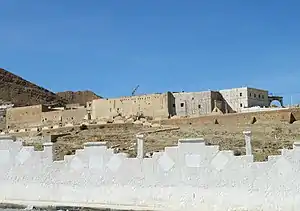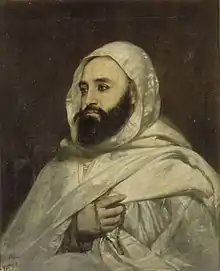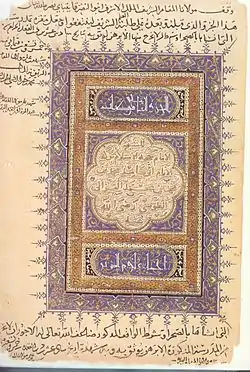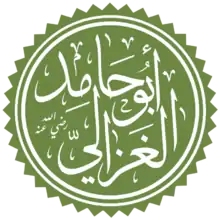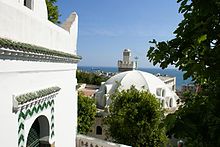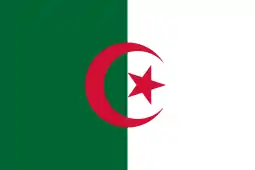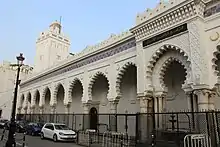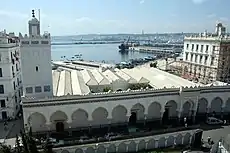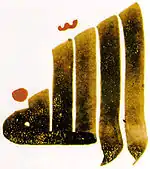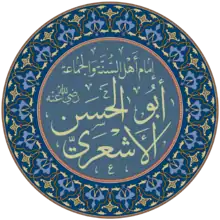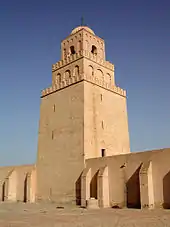Sufism in Algeria
Sufism is considered as an essential part of Islam In Algeria.[1] Sufism was fought and oppressed by the Salafists, and now is again regaining its importance as it was there before Algerian Civil War.[2] Sufis have a considerable influence on both urban and rural society of Algeria.[3] Sufism is the part of Algeria as long as 1400 years ago, so recognised as "Home of Sufi Marabouts".[4] Most of the people in Algeria are the followers and murids of Sufism.[5] Sufism has shaped Algerian society and politics for much of the country's history.[6] Today, very few are aware of this legacy. Might the Sufis now provide an important contribution to the stability of the country.[7]
| Part of a series on |
| Algerian Islamic reference |
|---|
  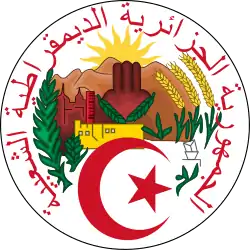 |
| Part of a series on Islam Sufism |
|---|
|
|
Part of a series on the |
|---|
| History of Algeria |
 |
Influence
Sufism is tightly bounded to the History of Algeria as it is said that the Ottoman governors of Algiers were traditionally crowned in the presence of a great Sufi Sheikh.[8]
Before and after 1830, under the power of Emir Abdelkader, the Sufis saw their position in Algerian society consolidated and reinforced by the Algerian popular resistance against French invasion.[9]
Many non-Sufi Muslims and Sufis united to face the Invasion of Algiers in 1830, the French conquest of Algeria and the hegemony of French Algeria.
Sufi Rituals and Practices
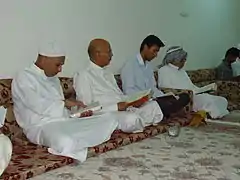
Ashewiq is a devotional Sufi music which is played and sung over the country according to different versions as Imzad.[10]
Other Sufi practices includes dhikr and wird, construction of various Qubbas and Zawiyas to spread Islam.
Rahmani Sufi order is one of the most dominant Sufi order in Algeria, which is a branch of Khalwati Tariqa and it is said to be influential to the present day.
Ashura, Mawlid, Mawsim, Sebiba and Tweeza are widely celebrated by the Sufis in Algeria.[11]
The regular Sufi practice in many of the Zawiyas in Algeria sees the presence of participants to the Hizb Rateb and the Salka without performing any other Sama or Whirling.
The only music performed with the verbal Dhikr is Madih nabawi, Nasheed and Achewiq, written and sung with rhythm and melody but without any musical instrument except Daf, by the poesy reciters and performers of Dhikr.
The anniversary of the birth and death of a Sufi Saint is observed annually in the so-called Mawsim.[12]
Large numbers of Murids attend these ceremonies, which are festive occasions enjoyed by the Murids as well as Scholar Muslims.
Many Murids, if not most, visit the graveside Maqams, some at least occasionally, many often, and an untold number rather regularly, throughout their lives.
People regularly visit these shrines to invoke by Tawassul the acceptance of their prayers to God (Allah) Almighty, and to offer votive prayers and donations.[13]
Involvement in politics
Official rulers of Algeria began with Sufi blessings when taking power claiming to have had the blessing of the marabouts and dervishes who endorsed the winner politicians, and the political governance always had a relationship of mutual patronage with Sufis.[14]
Impact of Sufism
The massive geographic presence of Islam in Algeria can be explained by the tireless activity of Sufi Khatibs and Sheikhs and Murshids.[15]
Sunni Sufism had left a prevailing impact on Algerian religious, cultural, and social life in this central region of Maghreb and North Africa.
The mystical form of Islam was introduced by Sufi saints and scholars traveling from all over continental Africa who were instrumental and influential in the social, economic, and philosophic development of Algeria.
Besides preaching in major cities and centers of intellectual thought, Sufis reached out to poor and marginalized rural communities and preached in local dialects such as Kabyle, Shilha, Mozabite, Shawiya versus Berber, and Arabic.[16]
Sufism emerged as a "moral and comprehensive socio-religious force" that even influenced other cultural traditions such as Berbers culture.
Their traditions of devotional practices and modest living attracted all people and their teachings of humanity, love for God and Prophet continue to be surrounded by mystical tales and folk songs today.
Sufis were firm in abstaining from religious and communal conflict and strived to be peaceful elements of civil society, and this attitude of accommodation, adaptation, piety, and charisma that continues to help Sufism remain as a pillar of mystical Islam in Algeria.[17]
Sufi orders
Many Sufi orders were widespread in Algeria in the late 1950s, including the following:[18]
- Alawiyya[19]
- Chabiyya[20]
- Darqawiyya[21]
- Dardouriyya[22]
- Habibiyya[23]
- Hansaliyya[24]
- Isawiyya[25]
- Karzaziyya[26]
- Khalwatiyya[27]
- Madyaniyya[21]
- Nasiriyya[28]
- Omariyya[29]
- Ouazzaniyya[30]
- Qadiriyya[21]
- Rahmaniyya[21]
- Senusiyya[31]
- Shadhiliyya
- Sheikhiyya[32]
- Taïbiyya[29]
- Tijaniyya[33]
- Youssoufiyya[34]
- Zaïaniyya[35]
- Zarrouqiyya[36]
List of Notable Algerian Sufis
Algeria is a birthplace of many Sufis such as:
- Sidi Abu Madyan (died 1198)[37][38]
- Ahmad al-Buni (d. 1225)[39][40]
- Mohamed al-Waghlissi (died 1241)[41][42]
- Ahmed al-Ghobrini (died 1304)[43][44]
- Mansour al-Mechedelli (died 1331)[45][46]
- Mohamed al-Melikechi (died 1339)[47][48]
- Ahmed al-Ilouli (died 1359)[49][50]
- Abderrahmane al-Waghlissi (died 1384)[51][52]
- Ali al-Menguellati (died 1412)[53][54]
- Sidi El Houari (died 1439)[55][56]
- Mansour al-Menguellati (died 1442)[57]
- Sidi Boushaki (died 1453)[58][59]
- Sidi Abd al-Rahman al-Tha'alibi (died 1479)[60][61]
- Sidi Ahmed Zouaoui (died 1488)[62][63]
- Sidi M'hamed Bou Qobrine (died 1793)[64][65][66]
- Sidi Ahmad al-Tijani (d.1815)[67][68]
- Ahmed bin Salem (d. after 1846)[69][70]
- Sidi Muhammad ibn Ali al-Sanusi (d. 1859)[71][72]
- Emir Abdelkader (d. 1883)[73][74]
- Lalla Zaynab (d. 1904)[75][76]
- Ahmad al-Alawi (d. 1934)[77][78]
- Abdul Baqi Miftah (b. 1952)[79][80]
See also
- Ministry of Religious Affairs and Endowments in Algeria
- Algerian Islamic reference
- Islam in Algeria
- Religion in Algeria
- Mosques in Algeria
- Hizb Rateb
- Zawiyas in Algeria
- Muftis in Algeria
- Ash'arism in Algeria
- Malikism in Algeria
- Ashura in Algeria
- Mawlid in Algeria
References
- al-Alwani, Taha J.; sadeq, A. H. M.; Osman, Fathi; Ellhyeb, Sahh Elpin El2kin; Farhan, Ishaq; Yusuf, Sakhudeen. American Journal of Islamic Social Sciences 69:2. International Institute of Islamic Thought (IIIT).
- Adamson, Kay (1998-01-01). Algeria: A Study in Competing Ideologies. A&C Black. ISBN 978-0-304-70012-7.
- Elmarsafy, Ziad (2014-08-20). Sufism in the Contemporary Arabic Novel. Edinburgh University Press. ISBN 978-0-7486-5566-3.
- Motadel, David (January 10, 2014). "Islam and the European Empires". Oxford University Press – via Google Books.
- Christelow, Allan (July 14, 2014). "Muslim Law Courts and the French Colonial State in Algeria". Princeton University Press – via Google Books.
- Bouasria, Abdelilah (February 11, 2015). "Sufism and Politics in Morocco: Activism and Dissent". Routledge – via Google Books.
- Diouf, Mamadou (January 8, 2013). "Tolerance, Democracy, and Sufis in Senegal". Columbia University Press – via Google Books.
- Geaves, Ron; Gabriel, Theodore (November 7, 2013). "Sufism in Britain". A&C Black – via Google Books.
- Morrow, John Andrew (March 15, 2012). "Religion and Revolution: Spiritual and Political Islām in Ernesto Cardenal". Cambridge Scholars Publishing – via Google Books.
- Esposito, John L. (October 21, 2004). "The Oxford Dictionary of Islam". Oxford University Press – via Google Books.
- Shinar, Pessah (January 10, 2004). "Modern Islam in the Maghrib". JSAI – via Google Books.
- Piraino, Francesco; Sedgwick, Mark (July 25, 2019). "Global Sufism: Boundaries, Narratives and Practices". Oxford University Press – via Google Books.
- "Against the Modern World" – via books.google.dz.
- Zhang, Chuchu (July 19, 2019). "Islamist Party Mobilization: Tunisia's Ennahda and Algeria's HMS Compared, 1989–2014". Springer – via Google Books.
- "Introduction to Sufism" – via books.google.dz.
- "Sufism" – via books.google.dz.
- "Sufism in Northern Nigeria" – via books.google.dz.
- https://books.google.dz/books?id=Vyg7ViBs4JAC&pg=PA22#v=onepage&q&f=false
- "ملتقى الطريقة الصوفية العلاوية: مستغانم عاصمة للتراث الروحي و الفكر الإصلاحي". جزايرس.
- "ص275 - كتاب تاريخ الجزائر الثقافي - الشابية - المكتبة الشاملة الحديثة". al-maktaba.org.
- "التصوف والطرق الصوفية" – via books.google.dz.
- "أضواء على الطريقة الرحمانية الخلوتية" – via books.google.dz.
- بن معمر, محمد (June 30, 2004). "مدينة وهران من خلال مخطوط الرحلة الحبيبية الوهرانية". Insaniyat / إنسانيات. Revue algérienne d'anthropologie et de sciences sociales (23–24): 47–60. doi:10.4000/insaniyat.5515 – via journals.openedition.org.
- الجزائري, الدكتور محمد حاج عيسى. "نبذة عن تاريخ الطرق الصوفية في الجزائر". islahway.com.
- "ص84 - كتاب تاريخ الجزائر الثقافي - الطريقة العيساوية - المكتبة الشاملة الحديثة". al-maktaba.org.
- "ص88 - كتاب تاريخ الجزائر الثقافي - الكرزازية الأحمدية والزيانية - المكتبة الشاملة الحديثة". al-maktaba.org.
- "البحوث السنية عن بعض رجال أسانيد الطريقة الخلوتية" – via books.google.dz.
- "الطريقة الناصرية الزيانية بشمال الجزائر – الناصرية". www.naciriya.com.
- بليل, عبد الكريم; الاكاديمي, مركز الكتاب (January 1, 2018). "التصوف والطرق الصوفية". مركز الكتاب الأكاديمي – via Google Books.
- "بذة عن تاريخ الطّرق الصّوفية في الجزائر". essalihine.yoo7.com.
- "محمد بن علي السنوسي.. شيخ الصوفية الذي غيّبه العقيد". جزايرس.
- مفتاح, عبد الباقي (January 1, 2009). "أضواء على الشيخ أحمد التجاني وأتباعه". Dar Al Kotob Al Ilmiyah دار الكتب العلمية – via Google Books.
- بليل, عبد الكريم; الاكاديمي, مركز الكتاب (January 1, 2018). "التصوف والطرق الصوفية". مركز الكتاب الأكاديمي – via Google Books.
- بليل, عبد الكريم; الاكاديمي, مركز الكتاب (January 1, 2018). "التصوف والطرق الصوفية". مركز الكتاب الأكاديمي – via Google Books.
- "- نبذة عن تاريخ الطّرق الصّوفية في الجزائر (2)". www.nebrasselhaq.com.
- بليل, عبد الكريم; الاكاديمي, مركز الكتاب (January 1, 2018). "التصوف والطرق الصوفية". مركز الكتاب الأكاديمي – via Google Books.
- https://www.djazairess.com/fr/latribune/30241
- https://www.djazairess.com/fr/infosoir/105941
- https://www.djazairess.com/elmassa/25763
- https://www.djazairess.com/elkhabar/237123
- https://www.djazairess.com/echorouk/11330
- https://archive.org/details/o_diraya/page/n281/mode/2up
- https://www.djazairess.com/fr/lexpression/205764
- https://www.djazairess.com/fr/elwatan/478750
- https://www.djazairess.com/elkhabar/263293
- https://archive.org/details/anwan-adirayah/page/n227/mode/2up
- https://al-maktaba.org/book/33514/402
- https://archive.org/details/Neilu_AlIbtihaj_Bi_Tatriz_Dibaj/page/n402/mode/2up
- https://archive.org/details/Neilu_AlIbtihaj_Bi_Tatriz_Dibaj/page/n100/mode/2up
- https://al-maktaba.org/book/33514/100
- https://www.djazairess.com/fr/horizons/168922
- https://www.djazairess.com/fr/elwatan/500029
- https://www.djazairess.com/fr/lesoirdalgerie/213879
- https://books.google.dz/books?id=PSh0DwAAQBAJ&pg=PT452#v=onepage&q&f=false
- https://www.djazairess.com/fr/elwatan/540260
- https://www.djazairess.com/fr/lnr/262277
- https://archive.org/details/Neilu_AlIbtihaj_Bi_Tatriz_Dibaj/page/n614/mode/2up
- https://www.djazairess.com/fr/lqo/5213392
- https://www.depechedekabylie.com/national/175021-proteger-imperativement-notre-referent-religieux/
- https://www.djazairess.com/fr/lnr/225984
- https://www.djazairess.com/fr/lnr/83842
- https://al-maktaba.org/book/33514/128
- https://www.djazairess.com/fr/lemidi/812270801
- https://www.djazairess.com/fr/horizons/108643
- https://www.djazairess.com/fr/elwatan/302210
- Burke, Edmund; Yaghoubian, David; Yaghoubian, Nejde (2006). Struggle and Survival in the Modern Middle East: Second Edition. University of California Press. ISBN 978-0-520-24661-4.
- Hanif, N. (2002). Biographical Encyclopaedia of Sufis: Africa and Europe. Sarup & Sons. ISBN 978-81-7625-267-6.
- https://www.djazairess.com/fr/apsfr/404922
- https://books.google.dz/books?id=an4gAQAAMAAJ&pg=PA50#v=onepage&q&f=false
- https://books.google.dz/books?id=WWA2GchD7yMC&pg=PA363#v=onepage&q&f=false
- https://www.britannica.com/biography/al-Sanusi
- https://books.google.dz/books?id=2bhpr7RTLMAC&pg=PA6#v=onepage&q&f=false
- https://books.google.dz/books?id=-oIeDQAAQBAJ&pg=PA125#v=onepage&q&f=false
- https://books.google.dz/books?id=mSDczf5iy4IC&pg=PA29#v=onepage&q&f=false
- https://books.google.dz/books?id=gMWgBgAAQBAJ&pg=PA73#v=onepage&q&f=false
- https://www.djazairess.com/fr/elwatan/410877
- https://www.djazairess.com/fr/elwatan/1295062
- https://www.djazairess.com/fr/lexpression/46378
- https://www.djazairess.com/fr/lemidi/907270802
- https://www.djazairess.com/fr/horizons/166528
.jpg.webp)
